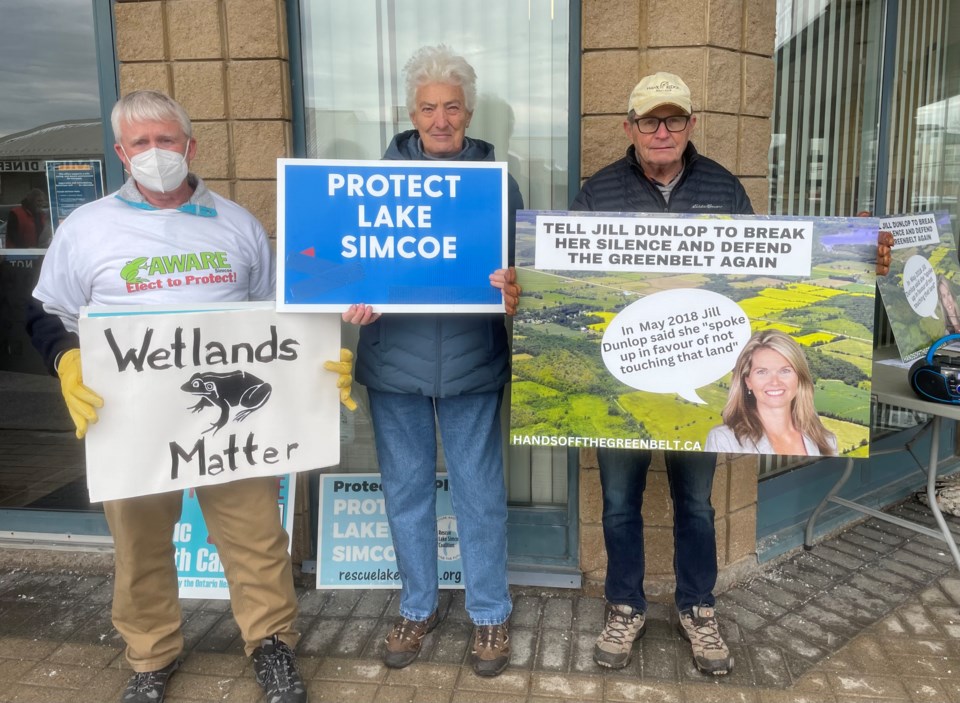LETTER: Bill’s effects on wetland system ‘unacceptable’

Bill 23’s change to wetland evaluation ‘smacks of a backroom deal to appease developers,’ says letter writer
Photo: Demonstrators in Orillia protested against Bill 23 on Dec. 2 2022
As more and more is revealed about the impact of Bill 23, opposition justifiably increases.
One major concern is the gutting of the Ontario Wetland Evaluation System (OWES). OWES is a points system used to evaluate wetlands to determine how significant they are. OWES assigns points based on hydrology and size, biological species, social history, and particular unique features of the wetland area; a maximum of 250 points per category. Based on this weighting, the area is determined to be significant (and therefore hands off in terms of development) if it scored more than 750 points, or not.
We know wetlands are essential to minimize flooding, absorb contaminants from runoff, cool water before discharging into streams and rivers where fish breed, and, of course, provide habitat for birds, animals and insects. They recharge our vital groundwater supply. They are recreational areas, and areas for hunting and fishing, which means they have economic and social value.
Land developers and speculators, of course, have no interest in protecting these wetlands, which are “too dry to swim in and too wet to build on,” but if they can manage to avoid the significant wetland designation, profits can be made by simply bulldozing and filling them in. This is what the updating and revision of the existing OWES is going to permit under Bill 23. Rather than taking the “whole” wetland area and calculating the total size of the wetland area collectively, individual pockets of marshy and swampy land, wetland pools, and ponds are measured individually. Given that individually they are small, they no longer will qualify for a large number of points, which is to say be considered insignificant.
In a blink of an eye, protection is lost, developers move in, houses are built and all the value and protection the wetlands provided the area are lost. Houses will be prone to flooding, eventually uninsurable as conditions change with the climate and loss of the natural mediation factors. Creeks will become drainage ditches swelling with every rain, eroding banks and ruining fish and animal habitat. Perhaps most importantly, one of our prime carbon-sequestering tools in the battle against climate change will also be lost.
Conservation authorities, which depended on OWES to present their case to prevent development on these sensitive areas, have now been silenced. There is no more impediment to bulldozing and filling wetlands in. What is perhaps the most alarming is that the evaluation system is taken out of the hands of the Ministry of Natural Resources and Forestry, and put in the hands of developers themselves, who merely hire a consultant to do their own evaluation. This is akin to asking the fox to guard the henhouse.
This plan to update and revise OWES is unacceptable and, frankly, irresponsible. It smacks of a backroom deal to appease developers. Our wetlands are not dispensable; they are invaluable. Once they are gone, they are gone. And there is no need to do any of this in order to build more housing units. Land is available for building housing units inside existing settlement areas. It is incumbent on this government to protect what is vitally important for Ontario now and even more so in the future.
Repeal Bill 23 and restore the powers of the conservation authority to oversee important protection for our environment.
Debbie Palmer
Oro-Medonte
read here









Leave a Reply